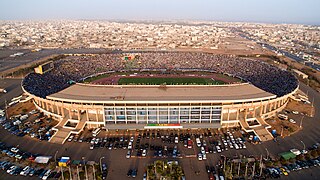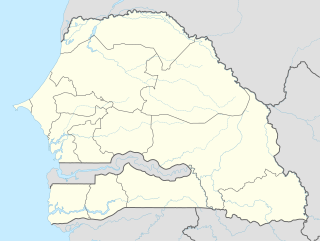
Léopold Sédar Senghor was a Senegalese poet, politician and cultural theorist who, for two decades, served as the first president of Senegal (1960–80). Ideologically an African socialist, he was the major theoretician of Négritude. Senghor was also the founder of the Senegalese Democratic Bloc party.

Léopold Sédar Senghor Stadium, formerly the Stade de l'Amitie, is a multi-purpose stadium in Dakar, Senegal. It is currently used mostly for football matches. It serves as a home ground of ASC Jeanne d'Arc and the Senegal national football team. It also has an athletics track, and is sometimes used for rugby union. The stadium holds 60,000. It was built in 1985 and named after Léopold Sédar Senghor, first president of Senegal.
This page details the process of qualifying for the 2008 African Cup of Nations.
This page details the process of the 1998 African Cup of Nations Qualification phase. Burkina Faso, as hosts, and South Africa, as title holders, qualified automatically.

Stade Demba Diop is a multi-use stadium in greater Dakar, Senegal. It is situated on Boulevard Président Habib Bourguiba in Sicap-Liberté, an urban arrondissement of Dakar. Several football clubs use this stadium for their home games.
This page provides the summaries of the CAF second round matches for the 2010 FIFA World Cup qualification and the 2010 Africa Cup of Nations. The 48 qualifiers were split into 12 groups of four in the draw held in Durban, South Africa, on 25 November 2007. Teams in each group played a home-and-away round-robin in 2008, with the 12 groups winners and 8 best runners-up advancing to the third round. As not all groups were of equal size after the exclusion of Ethiopia and the withdrawal of Eritrea, when ranking the runners-up, their results against their group's 4th placed team would not be counted.
This page details the process of qualifying for the 2002 African Cup of Nations.
The 2006 FIFA World Cup qualification CAF Group 1 was a CAF qualifying group for the 2006 FIFA World Cup. The group comprised Congo, Liberia, Mali, Senegal, Togo and Zambia.
This page details the process of the 2012 Africa Cup of Nations qualification phase. Forty-six African nations, including hosts Gabon and Equatorial Guinea, entered the competition. Gabon and Equatorial Guinea automatically qualified as host countries. The other 44 nations were drawn into eleven groups, each containing 4 teams. Togo was later added to Group K after its reinstatement.
This page details the process of qualifying for the 2000 African Cup of Nations.
The CAF Second Round of 2006 FIFA World Cup qualification began on 5 June 2004 and finished on 8 October 2005.
The CAF Final Round of 2002 FIFA World Cup qualification was contested between the 25 winners from the First Round split across 5 groups.

The 2015 African U-20 Championship was the 20th edition of the biennial international youth football tournament organized by the Confederation of African Football (CAF) for players aged 20 and below. The tournament took place in Senegal between 8–22 March 2015.

The 2015 Africa U-23 Cup of Nations was the 2nd edition of the Africa U-23 Cup of Nations, the quadrennial international age-restricted football championship organised by the Confederation of African Football (CAF) for the men's under-23 national teams of Africa. The tournament started on 28 November and finished on 12 December 2015. A total of eight teams are playing in the tournament.
Group G of the 2015 Africa Cup of Nations qualification tournament is one of the nine groups to decide the teams which qualify for the 2015 Africa Cup of Nations finals tournament. Group G consists of four teams: Tunisia, Senegal, Egypt, and Botswana, where they play against each other home-and-away in a round-robin format.
Group K of the 2017 Africa Cup of Nations qualification tournament was one of the 13 groups to decide the teams which qualify for the 2017 Africa Cup of Nations finals tournament. The group consisted of four teams: Senegal, Niger, Namibia, and Burundi.
The third round of CAF matches for 2018 FIFA World Cup qualification was played from 7 October 2016 to 14 November 2017.
This page provides the summaries of the matches of the qualifying rounds for the Football at the 1988 Summer Olympics to be held in Seoul. Three countries qualified.
Group A of the 2019 Africa Cup of Nations qualification tournament was one of the 12 groups to decide the teams which qualify for the 2019 Africa Cup of Nations finals tournament. The group consisted of four teams: Senegal, Equatorial Guinea, Sudan, and Madagascar.
The 2018 CAF Champions League qualifying rounds were played from 10 February to 18 March 2018. A total of 59 teams competed in the qualifying rounds to decide the 16 places in the group stage of the 2018 CAF Champions League.
This page is based on this
Wikipedia article Text is available under the
CC BY-SA 4.0 license; additional terms may apply.
Images, videos and audio are available under their respective licenses.





